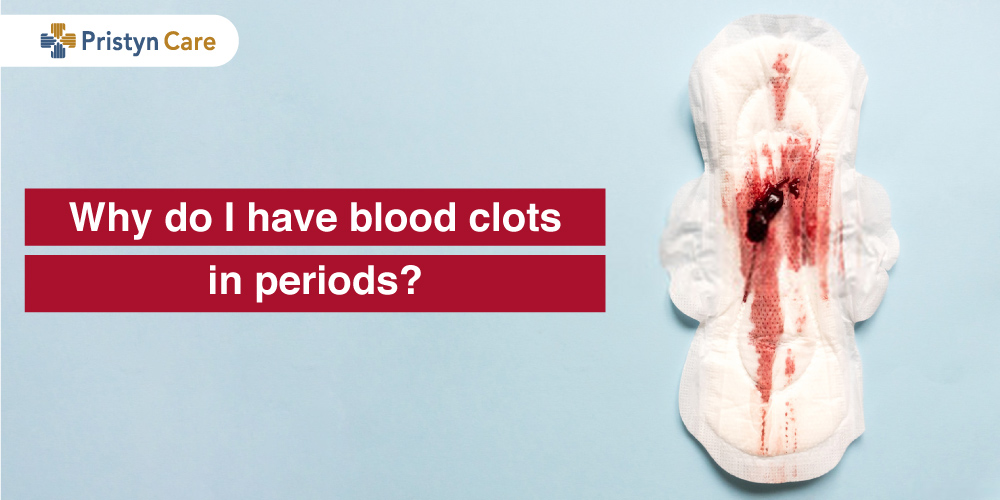
A lot of women get blood clots during their periods. These menstrual blood clots are like clumps of blood and tissue that are expelled out from the uterus during periods. They are dark in color and look somewhat like the little fruit lumps that you find in jam.
Table of Contents
Difference between normal menstrual clots and abnormal menstrual clots
Clots that are small and are around the size of a quarter (about 2.5 gms) or less are normal in the menstrual cycle. If they are occasional and infrequent, it is not something you need to worry about. Normal menstrual clots occur usually at the beginning of your menstrual cycle. It is usually the clots that form in the blood vessels that are dangerous as they are capable of blocking the blood flow. But the clots during the menstrual cycle are not the same as the venous clots and hence not harmful to the female body.
But if the blood clots in periods are frequent and larger than the earlier mentioned size, it can be a sign that you need medical attention. Abnormal menstrual clots occur not only in the beginning and more frequently.
Also Read: Why does period blood vary in color and what does it indicate?
What are the underlying causes of menstrual clots?
1. Hormonal and physical changes
Changes that the body goes through during the monthly periods have an impact on the menstrual cycle. These can impact the menstrual cycle and lead to heavier flow. A heavy flow increases the chances of developing period blood clots.
Hormonal imbalances and conditions like hypothyroidism, PCOS, perimenopause, and menopause, can irregular periods, which may result in clotting and heavy bleeding.
2. Uterine Fibroids
It is another common factor that might be causing abnormal menstrual clots. Fibroids are noncancerous in nature and are muscular tumors that grow in the walls of the uterus. Around 8 in 10 women develop fibroids by the age of 50. There are no definite causes to it. Hormonal imbalance and obesity are among the major risk factors for uterine fibroids.
Uterine fibroids are also responsible for other abnormalities like:
- Heavy bleeding in periods
- Irregular periods
- Pain in the lower back
- Painful intercourse
- pregnancy-related complications
- Fertility issues
- Protruding tummy and weight gain
3. Uterine obstructions
Uterine obstructions can cause extra pressure on the uterus. This increases the possibility of developing menstrual clots that might be abnormal in maturity. Such a condition of the obstructed uterus can arise due to injury or inflammation of the uterus.
4. Endometriosis
It is a major reason for the development of period blood clots. In endometriosis, the lining of the uterus starts to grow on the outside and in the reproductive tract. Women suffering from endometriosis experience heavy painful menstrual bleeding along with large blood clots (of endometrial tissues).
5. Miscarriage
Miscarriage in the past might lead to cramps, heavy flow, and menstrual clots. The bleeding due to miscarriage contains fetal tissues and blood clots larger than the normal period.
6. Cancerous tumors
Cancerous tumors inside the uterus and cervix can be responsible for heavy menstrual bleeding with abnormal menstrual clots. Such tumors should be treated in time before they burst and spread to other parts of the reproductive tract.
7. Adenomyosis
It is a condition in which the lining of the uterus grows into the uterine wall. The condition is marked by the uterus losing the ability to contract. This results in heavy bleeding and the formation of large clots. This causes thickening and enlargement of the uterus. The actual reasons for the condition are unknown.
8. The Von Willebrand Disease or the VWD
This disease affects 5 to 25 percent of women who suffer from chronic and heavy menstrual bleeding and may be a cause for period blood clots. Though there is no permanent cure for VWD, doctors help in providing symptomatic relief.
What are the complications related to large menstrual clots?
If you are having unusually large period blood clots and that too frequently, you should see a doctor about that. A side effect of heavy bleeding and menstrual clots is iron deficiency anemia. Anemia occurs when there is insufficient iron in your body, and no healthy red blood cells can be produced because of it. Some symptoms of anemia are:
- Tiredness
- Weakness
- Pale complexion
- Shortness of breath
- Pain in chest
How are the causes of menstrual causes clots diagnosed?

To effectively diagnose the cause of abnormal menstrual clots, the doctor will ask you questions about some factors that might be responsible for them. For instance, you might be questioned about any history of pelvic surgery, use of birth control, or past pregnancy. In such cases, uterus examination becomes all the more necessary.
Your doctor might conduct a blood test to check for any hormonal fluctuations. An MRI or ultrasound can also be conducted to check for the presence of any fibroids, tumors, endometriosis, etc.
What is the treatment for menstrual clots?
The best way to treat menstrual clots is to control heavy bleeding. There are several ways to do so.
Some of the treatments for heavy menstrual bleeding are:
Controlling heavy menstrual bleeding is possibly the best way to control menstrual clots.
Use of hormonal contraceptives and medications.
Hormonal contraceptives stop the growth of the lining of the uterine wall. An IUD with progestin-release may also help to reduce around 90 percent of the flow. Birth control pills also help to reduce almost half of the menstrual flow. Some women don’t prefer the use of hormonal medication. They can opt for medicines with tranexamic acid as it helps in controlling blood clotting.
Surgical methods
Following a miscarriage, a dilation and curettage (D&C) procedure is used. However, it can also be conducted to determine the cause of heavy menstrual flow and abnormal menstrual clots.
In case of severe uterine fibroids or polyps, gynecologists recommend surgical procedures such as myomectomy or hysterectomy.
Also Read- Safe and Legal Medical Termination of Pregnancy at Pristyn Care
Overview
In a woman’s reproductive cycle, menstrual clots are a normal thing. Despite looking alarming sometimes, small clots are normal and harmless. Even if the clots you are passing are bigger in size, you should not be worried about them unless they start becoming regular and frequent. In such a case, talk to your doctor or consult with a gynecologist and get information about the causes and treatment options for this.
Also Read:







